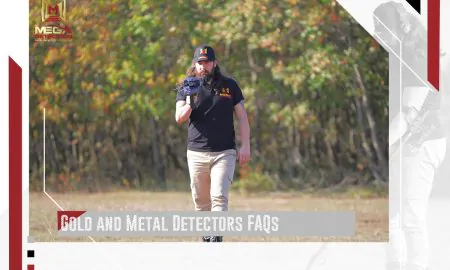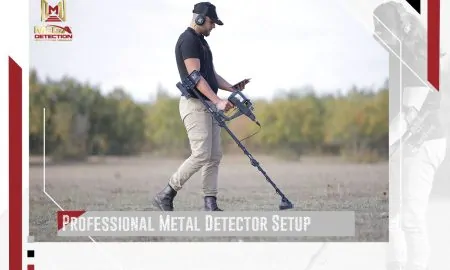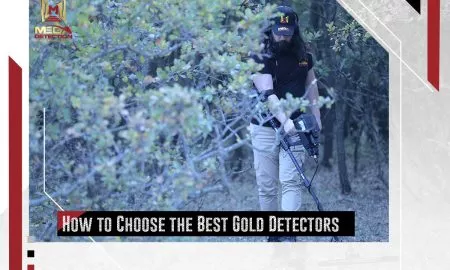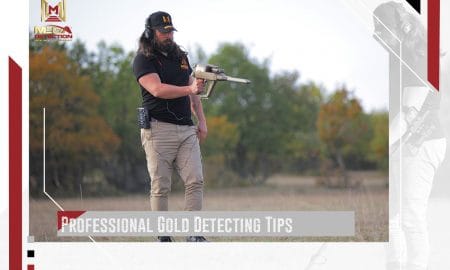
Metal Detecting Mistakes and How To Train For Detecting
megalocators2022-06-10T13:23:48+02:00You just got your new metal detector and are ready to get outside and start hunting. Before you do, take a look at the following mistakes that are common to new detectorists. Avoid these blunders and you will enjoy your new hobby even more than you thought.
1. Trespassing
Ask any detectorist and they will tell you that the number one rule of metal detecting is that you must get permission before searching on any land. Yet, many people still just break out their equipment and start hunting without giving it a second thought. Getting permission isn’t always easy, but you must do it. It will save you the heartache and hassle of getting caught and it will help ensure that other detectorists can continue enjoying the hobby as well.
2. Using the Wrong Digging Tools
There are many options for digging tools out there, from hand-held trowels to detecting shovels. Because leaving the sites where you dig in good condition is important, it’s also important that you use the right size and type of digger. Also, remember to consider what type of ground you will be digging in, the hard desert ground will need a much stronger digger than the sand on a beach.
3. Not Doing Enough Research
The best searches are often the ones in which detectorists spend some time researching. While you may get lucky and find something of value randomly from time to time, knowing the area – and its history – you are searching for will make it much more likely.
4. Not Carrying Extra Parts
If you don’t carry extra coil bolts, batteries, straps, and headphones, there will come a time that you regret it. It’s really frustrating when you are in the middle of a successful hunt and you have to go home to retrieve extra parts.
5. Using Ineffective Search Patterns
It takes a while to get into the “swing” of detecting. Some new detectorists move their detector too fast or don’t follow a logical pattern when they search. Determine what pattern works for you (many detectorists utilize a grid pattern) and move the detector slowly.
6. Not Devoting Enough Time
Like any hobby, metal detecting requires a certain amount of time. The more time you spend searching, the better you will get to know your detector and the more successful your searches will be.
7. Buying the Wrong Detector
Many people who decide to start detecting buy the wrong beginning detector. Some may buy one that is too complicated and get frustrated with all the settings, while others may buy one that is too much like a toy and get frustrated when they don’t find anything. Talk with someone knowledgeable about buying metal detectors and find one that provides a happy medium.
8. Not Using a Pinpointer
Using a pinpointer metal detector to help you narrow down a target’s location will make your hunting much easier. Metal detectors will alert you when they are over the target, but a pinpointer will save you a lot of time digging and sifting for the item.
9. Cleaning Old Relics and Coins
Rookie detectorists are often tempted to clean their finds. It’s understandable, especially if you want to display them. However, in some cases, cleaning an antique find or an old coin may greatly decrease their value. Before you break out the soap and scrub-brush, determine what exactly you have and if cleaning it is recommended. Online forums and metal detecting clubs will allow you to consult with other detectorists to find out.
10. Having Unrealistic Expectations
Metal detecting is meant to be a hobby, not a way to get rich. While you may find some truly valuable relics or jewelry and coins every so often, don’t set your expectations too high or you are likely to be disappointed. When you enjoy the process of metal detecting, you will find that it’s a hobby that is rewarding whether you find lots of treasure or you don’t.
Creating a Test Garden
If you want to practice metal detecting at home, consider creating a test garden.
Creating a test garden requires some physical labor, but it isn’t as hard as planting a garden for flowers, shrubs, fruits or vegetables. You want some vegetation left on the ground to make it more challenging, but you also want to be able to reach your targets once the metal detector goes off.
- Use your metal detector to completely clear the soil of any existing metal objects from the area you are going to use for testing. You don’t want anything to ruin your progress.
- Mark off your test site with markers or plants to ensure that your test garden won’t see a lot of foot traffic.
- Clear bigger shrubs and vegetation from the area.
- Once the area is cleared, gather a bag of metal targets of various metals, sizes, and worth. Use old coins, hair pins and, if possible, purchase a bag of targets.
- Dig holes throughout your test garden and “plant” your metal targets anywhere from two to 15 inches below the ground.
- Spread the dirt back over the holes and give it a couple of days so that vegetation and grass start to grow back.
Using Your Test Garden
Once you’ve “planted” your garden, the real fun begins. Most all-purpose metal detectors have preset search modes. Choose one of those to start with and swing your metal detector over your garden. Harnesses are available that distribute the weight of the detector if you find yourself getting tired.
- Start off by performing air tests. Swing your metal detector over items like coins and jewelry above ground so that you know what tones your detector will make. A metal detector will emit a different sound for different types of metal finds.
- Move on to the buried items.
- Log what you found and describe the sound, as well as the number displayed if your metal detector has a digital interface.
- If you want to move beyond the preset search modes, use this time to optimize your search settings.
- Newly buried coins may be hard to detect. That’s because of something called the halo effect. When a coin is buried for a long time, some of the metal properties “leak” into the ground, giving off a stronger signal. The longer your coins are buried, the more easily you’ll find them later!
Maintaining a Test Garden
Even though your test garden is just a test, it still requires basic maintenance. It’s easier to find hidden metal under the ground when it’s barren with no vegetation getting in the way, but you won’t find that when metal detecting in the best places, like the woods or even around the beach.
Make sure to water your garden. Keep a garden hose nearby with a hose reel. Not only does this keep your hose from being an obstacle, it will also prevent it from being kinked.
Conclusion
A test garden will not only give you time to get used to your metal detector, but it will also give you all of the benefits of gardening for relaxation and stress relief.
Start your test garden today and get one step closer to digging up some real treasure. Maybe the next person to dig up a great metal detecting find in the news will be you! And if you don’t feel like creating your own metal detector test garden, you can always visit us at our Florida showroom and use our very own indoor test garden!











Leave a Reply